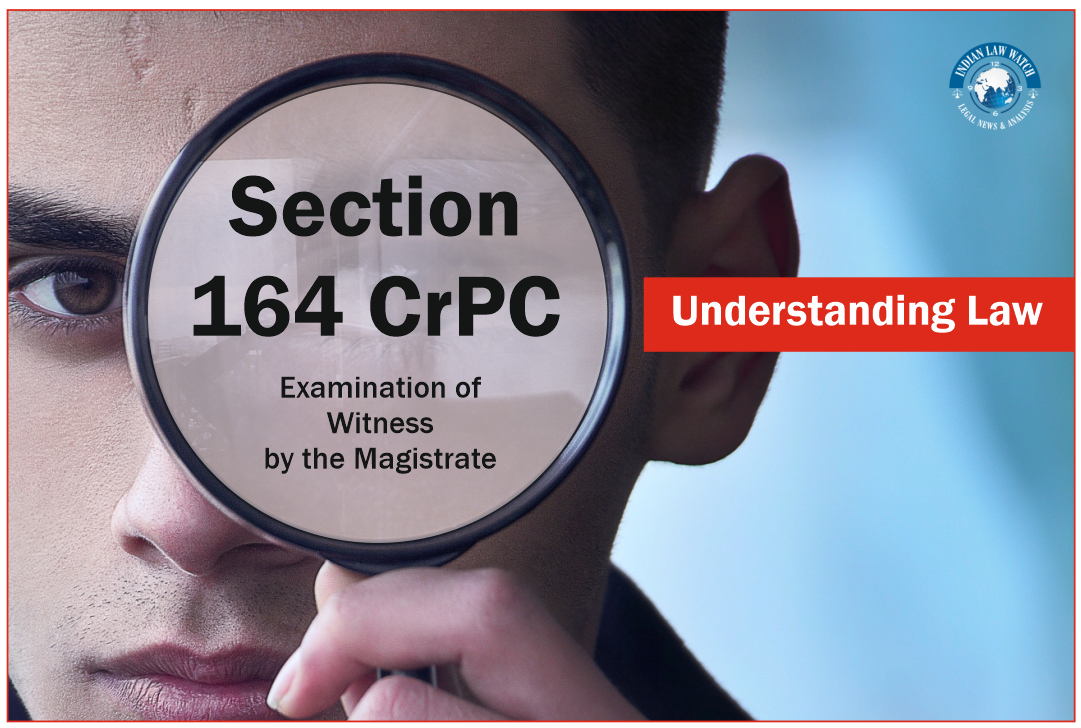
Examination of accused under section161 CrPC is popularly known as interrogation. The object of examination of witness u/s.161 CrPC is to produce the evidence before the court at the time of trial. Further these statements are useful for the court for framing the charge. Before trial commences copies of these statements recorded by the police should be furnished to accused free of cost.
Confession is voluntary admission of guilt by the accused person. As per S.25 of Indian Evidence Act confession recorded by police officer is inadmissible in evidence. That is the reason behind S.164 CrPC authorizing the Magistrate to record the confession statement of the accused as per procedure prescribed to ensure it has voluntariness. Unless the Court is satisfied that the confession is voluntary in nature, it cannot be acted upon and no further enquiry as to whether it is true or trustworthy need to be made.
Under section 164 the confession of the accused is recorded and also the statements of the witnesses.
Section 164 of the code does not provide for recording of any statement of an accused person other than a confession.
This section specifically provides record of two clauses of a thing i.e.
(1) the statement of the witnesses and
(2) confession of a person accused of an offence.
As per section 164(1) of Code Judicial Magistrate or Metropolitan Magistrate whether or not having jurisdiction in the case can record any statement or confession made to him in the course of investigation.
Section 164(5) of code:The Magistrate is also empowered to administer the oath to the person making such statement. The statement of the witnesses recorded in the course of investigation under section 164 of the Code shall be forwarded to the Judge by whom the case is enquired into or tried.
The term “statement” is not defined anywhere in the Act. However, it has got wide connotation. Section itself contemplates that statement which is either written by the witness himself or reduced to writing by someone else and so, the statement recorded under section 164 of the Code is previous statement of the witness. The section speaks of “ In his confession or statement”. It may be the statement of an accused person which is a non-confessional statement or of a witness capable of giving useful information relating to an offence. The word statement means a statement of a witness does not mean a statement of the accused person.
The statements which were made by the persons at identification parade are nothing but the statement under section 164 of the Code. A statement made under section 164 of the code is not inadmissible in the evidence and may be used to corroborate or contradict a statement made in the Court in the manner provided under section 157 and 145 of the Evidence Act.
The statement made under this section cannot be used as a substantive piece of evidence. But it can be used for the purpose of corroboration. It can be used to cross-examine the persons who made it to show that the evidence of the witness is false but that does not establish that what he stated out of court under this section is true. A statement made by a witness under section 164 of the Code can be used for the purpose of cross-examining him and discrediting his evidence in the session’s court.
The object of recording of statements of witnesses under section 164 of the Code is two fold;
(1) to deter witnesses from changing their versions subsequently and
(2) to get over the immunity from the prosecution in regard to information given by the witnesses under section 162 of the code. The another reason of recording statement of witnesses under section 164 of the code is to minimize the chances of changing the versions by the witnesses at the trial under the fear of being involved in perjury.
Section 145 apparently does not distinguish between the statement under section 162 or statement under section 164 of the Code and there is no additional weightage is given to the statements recorded under section 164 of the Code for the purpose of contradicting a witness. The object behind it that when during the course of investigation police records the statements under section 162 of the Code they cannot administer oath to the person making statement and cannot obtained his signature, but under section 164 of the Code, a magistrate recording statement of a person can administer oath to him and obtain his signature over the statement.
While recording of evidence of a person we do not obtained the signature whose evidence is being recorded. That itself means that while recording a statement there is no need to obtain the signature of a witness who is making his statement before the magistrate. Thus after recording a statement of witness a magistrate should endorse his certificate at the foot of such statement. The statement recorded under section 164 of the code is the public document according to the section 74 of the Evidence Act. Such statement is admissible in evidence under section 80 of the Evidence Act.




